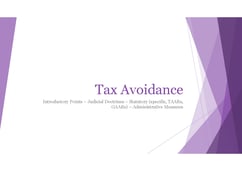Davenport v Chilver [1969] 57 TC 661
Judgement for the case Davenport v Chilver
Table Of Contents
The taxpayer’s mother owned Latvian property. All the Latvian property was confiscated without compensation during the war. The mother died in 1966 and by her will she left to the taxpayer a half share of any compensation which might become due to the mother in respect of her expropriated property.
In 1926 the taxpayer's estate became entitled to compensation from the UK government in respect of the confiscated Latvian property. The Revenue claimed the compensation was a capital sum derived from an asset, namely the rights created by the 1969 Order, and that therefore there was a deemed disposal under section 22(1).
-
S22(3) applied only to assets which had been owned by the person treated as disposing of them.
The taxpayer had never been the owner via her mother's estate as her mother had no such property at her death, and the taxpayer, by the will, acquired no more than a hope that she might at some time receive compensation.
However, the Order conferred on the taxpayer a right which was itself property and an asset within s22(1). The compensation payment was thus a capital sum derived from that asset within the general words of s22(3).
It was acquired by the taxpayer otherwise than by way of a bargain made at arm's length and accordingly, by virtue of s 22(4)(a), was to be deemed to have been acquired for consideration equal to its market value.
Nourse J
In our view the decision of Templeman J in Davis v Powell is authority for the proposition that a statutory right to compensation in respect of property which has already been lost does not give rise to capital gains tax liability.
Decision amounts to saying that a bare statutory right is an asset for CGT purposes. Why can’t this lead to double taxation in respect of the daughter’s own property. Two separate assets here.
NB that the distinction to be drawn between this case and others, including Davis, is that there was a separate, distinct, fund (whether or not that is a satisfactory distinction)
RELATED CASES
For Further Study on Davenport v Chilver
Need instant answers? Our AI exam tutor is here to help.
Ask questions 🙋 Get answers 📔 It's simple 👁️👄👁️
Our AI is educated by the highest scoring students across all subjects and schools. Join hundreds of your peers today.
Get StartedSimilar Cases
Related Product Samples
These product samples contain the same concepts we cover in this case.
| Tax Law | Capital Gains Tax Notes (17 pages) |

 Since 2010, Oxbridge Notes has been a trusted education marketplace, supplying high-quality materials from top achievers at universities like Oxford, Cambridge, LSE, Harvard, and Yale.
Since 2010, Oxbridge Notes has been a trusted education marketplace, supplying high-quality materials from top achievers at universities like Oxford, Cambridge, LSE, Harvard, and Yale.